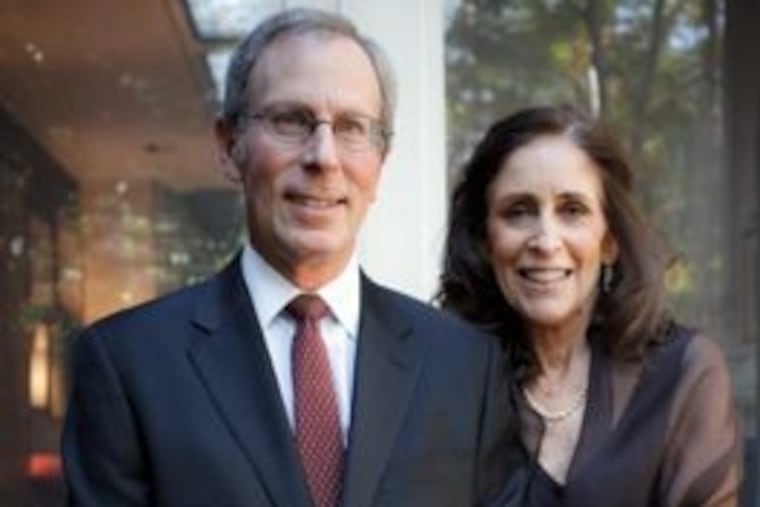Alan M. Zuckerman, health-care strategist and management consultant, dies at 70
He founded Health Strategies & Solutions, Inc., which later became Veralon Partners, and his local clients included the University of Pennsylvania Health System and Abington Hospital.

Alan M. Zuckerman, 70, of Philadelphia, a national leader in health-care strategy, a management consultant, and a valued mentor to colleagues and relatives, died Wednesday, Feb. 3, of pancreatic cancer at Penn Hospice at Rittenhouse.
Mr. Zuckerman, a Center City resident for more than 40 years, founded a consulting firm that helped some of the nation’s major medical centers, health-care systems, community hospitals, physician groups, nursing homes, and retirement communities plot their organizational futures.
Richard Liekweg, president and CEO at BJC HealthCare, based in St. Louis, said Mr. Zuckerman helped him often as Liekweg changed jobs and needed innovative strategic plans for his new companies.
“He was passionate about health care and visionary in what he saw the unique role academic health systems play,” Liekweg said.
In a tribute, Mr. Zuckerman’s family wrote that he was relentless “to never settle for conventional solutions when something unique and pathbreaking was needed.”
Mr. Zuckerman founded Health Strategies & Solutions Inc. in 1997. After 17 years as its president and CEO, he merged the business with another firm to form Veralon Partners. He was chair of Veralon until 2017, then became an independent consultant. He never retired.
Over the years, the firm boasted such local clients as the University of Pennsylvania Health System, Thomas Jefferson University Hospitals, Temple University Hospital, Main Line Health, and Abington Hospital.
“He was tactful, diligent, and loyal” said his wife, Rita Bernstein, a longtime civil rights and women’s rights lawyer and advocate. “He came from a high-achieving family, and had high expectations of himself.”
Born in Brooklyn on May 27, 1950, Mr. Zuckerman earned his bachelor’s of arts and master’s of economics degrees at Stony Brook University. He moved to Philadelphia in the 1970s for a new job, and met Bernstein, also a native New Yorker, in 1980 at a birthday party.
They married two years later, settled in Center City, and raised their son, Seth, and daughter, Joanna. Mr. Zuckerman’s work often sent him out of town for days at a time, but his wife and children said they never felt deprived of his attention.
On his return, Mr. Zuckerman usually picked up where he had left off: cooking meals, cleaning house, shopping for groceries, and handling family issues. “He was reliable, solid, dependable,” his wife said. “And he did it all seemingly effortlessly.”
“He was present and engaged,” said his son. “He made us a priority.”
Mr. Zuckerman was managing partner of Chi Systems, an Ann Arbor, Mich.-based health-care consulting firm, before forming Health Strategies & Solutions. He was known by colleagues for his sense of humor, candid and constructive feedback, and respectful manner “as if he knew you forever as a friend,” Liekweg said.
As a mentor, he encouraged other health-care professionals to stretch their thinking and break down traditional barriers. His son is an executive with a health-care services company, and the two often exchanged ideas about the industry. “He had a nice touch,” his son said. “He expressed himself so well but never pushed too hard.”
Mr. Zuckerman wrote seven books and hundreds of articles about health-care issues. His 1998 book, Healthcare Strategic Planning: Approaches for the 21st Century, won the American College of Healthcare Executives’ James A. Hamilton book of the year award in 1999.
He was also on the advisory board of Arcadia University, a guest lecturer at Drexel University and at many national conferences and seminars, and a celebrated longtime faculty member of the American College of Healthcare Executives.
“For generations he was Mr. Inside, not only knowing the latest regulation out of Washington but also how it uniquely applied to each health system’s strategy,” said Kevin Mahoney, CEO of the University of Pennsylvania Health System.
An avid golfer who played at first on public courses as a teenager in Queens, Mr. Zuckerman later joined the Philadelphia Cricket Club and LuLu Country Club. He and his son had 76ers season tickets and played tennis together.
He also devoted much time and energy to community projects in Eagles Mere, Pa., where the family spent many weekends and summer vacations.
Liekweg said his long friendship with Mr. Zuckerman “got better with age — just as he liked his wine.”
In addition to his wife and children, Mr. Zuckerman is survived by a sister, two grandchildren, ex-wife Ronnie Jacobs, and other relatives.
A private service and funeral were held Friday, Feb. 5.
Donations in his name may be made to the Eagles Mere Foundation, P.O. Box 402, Eagles Mere, Pa. 17731.